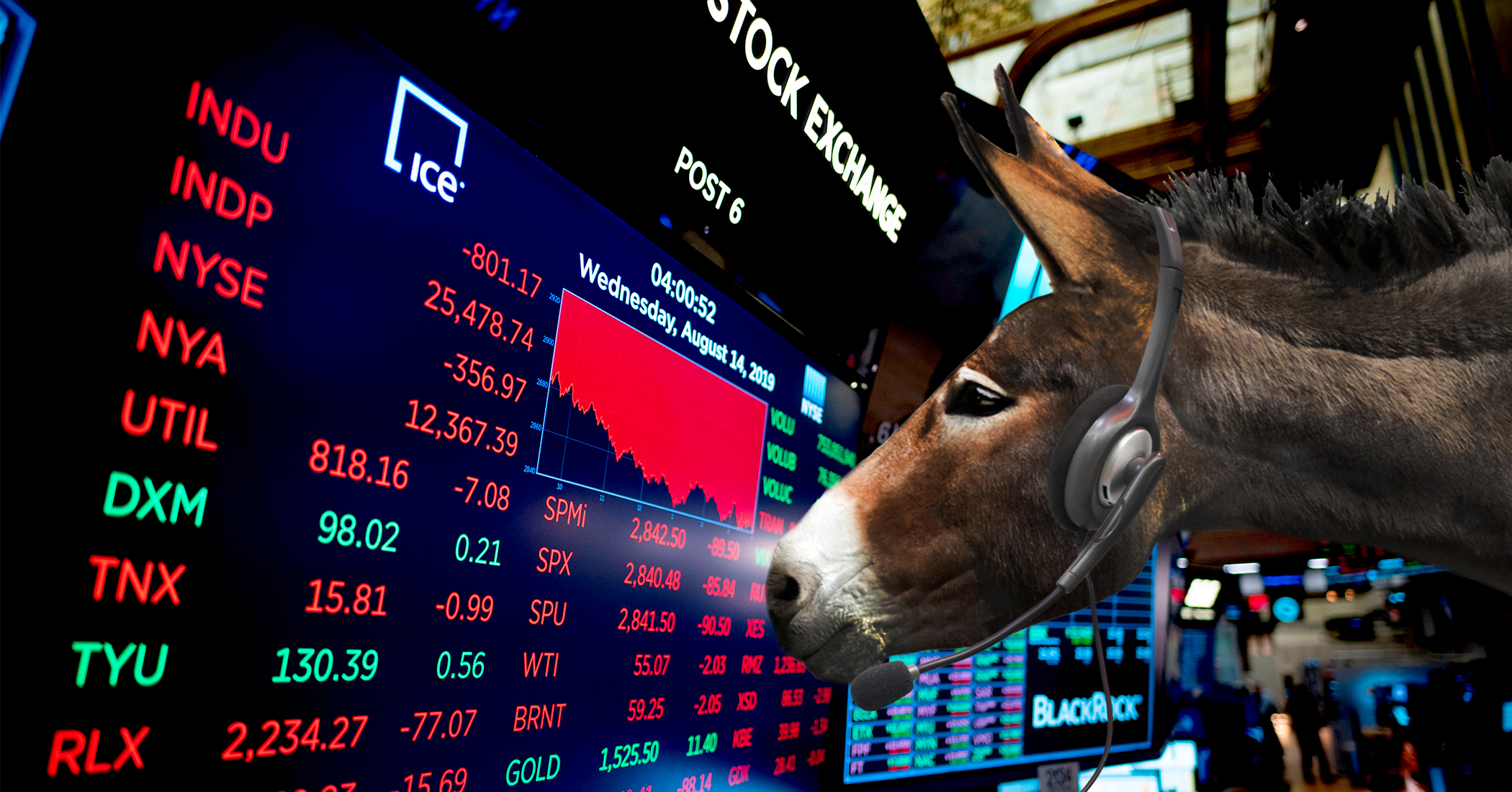The Democrats need a recession plan
It's time to show they've learned from Obama's mistakes


A free daily email with the biggest news stories of the day – and the best features from TheWeek.com
You are now subscribed
Your newsletter sign-up was successful
There has been talk of a possible recession on the horizon for a while now, but recently the signs have become even more pronounced. A number of indicators suggest the onset of an economic downturn before next year's election is more and more likely, from the inverted yield curve to record levels of corporate debt, not to mention an increasingly volatile stock market. A survey conducted earlier in the summer by Duke University found that 7 in 10 CFOs from around the world believe that a recession will hit by the end of 2020, while Morgan Stanley analysts recently predicted that, if the trade war with China continues, we'll be in a recession within nine months.
The simple fact is, more than a decade removed from the 2008 financial crisis, we are due for a recession and, while it is impossible to say whether this will come before or after 2020, voters and candidates alike should accept that it is coming.
It is not without irony, of course, that Donald Trump, who got elected by trashing the economy under Obama only to take credit for the same economy immediately upon becoming president, will deserve much of the blame when it arrives. As the Nobel Prize-winning economist Joseph Stiglitz, who believes there will "almost surely" be a global economic slowdown in the near future, remarked last week, the president is "throwing hand grenades into the global economy," which will only bring on the inevitable downturn sooner — and make it that much worse. If a recession does come before next year's election, it will instantly boost the eventual Democratic nominee's chances against Trump, who is already personally unpopular and thus unlikely to win reelection without a strong economy.
The Week
Escape your echo chamber. Get the facts behind the news, plus analysis from multiple perspectives.

Sign up for The Week's Free Newsletters
From our morning news briefing to a weekly Good News Newsletter, get the best of The Week delivered directly to your inbox.
From our morning news briefing to a weekly Good News Newsletter, get the best of The Week delivered directly to your inbox.
It seems like a good time, then, to reflect on the crisis that threatened the entire global economy 10 years ago and the decisions that Trump's predecessor and other Democratic leaders made in response to that crisis. Fortunately, a new book by Reed Hundt, the former head of the FCC under Bill Clinton and longtime Democratic strategist, provides an insider look into the Obama administration's decision-making process a decade ago and the unintended consequences of the president's chosen policies. Through interviews with dozens of Obama officials and other insiders, Hundt paints a depressing picture of a missed opportunity in his aptly titled A Crisis Wasted, which serves as a warning of what not to do next time a crisis strikes (especially if Democrats find themselves in power again).
The basic premise is familiar: President Obama had a once in a generation opportunity to introduce radical and fundamental changes to a corrupt and unstable economy and political system, yet instead chose to rescue that system and preserve what should have been replaced. Perhaps the biggest mistake Obama made before his presidency even began was to bring on a team of Clintonites as his economic advisers. According to Hundt, these advisers imported "their neoliberal axioms" to the Obama transition team and from that moment on dominated the policy discussion.
"By asking for and following the views of the neoliberal economists," Hundt writes, "Obama adopted not only their assumptions about the economy's behavior, but also their moral code. All advice — whether from lawyers, consultants, economists, or doctors — comes from a world view."
Obama decided "against boldness" and accepted the neoliberal worldview, prioritizing the interests of the big banks over the interests of underwater homeowners and workers — evidenced by his choice of Treasury Secretary, Timothy Geithner, who never failed to side with Wall Street — and rejecting populism in favor of pragmatism. Obama did not push for policies that would have benefited millions of homeowners (such as "cramdown" reform) or for the prosecution of fraudulent Wall Street executives (Attorney General Eric Holder favored financial settlements over criminal prosecution, fearing the "collateral consequences" that punishing top dogs could have on the market), and fully endorsed the bank bailouts that his Republican predecessor signed into law a few months before his inauguration.
A free daily email with the biggest news stories of the day – and the best features from TheWeek.com
This response to the financial crisis had many unforeseen consequences, but most important was the anti-establishment explosion of populism that followed (and ultimately the election of Trump). While Wall Street saw a remarkable recovery during the Obama years, Main Street's recovery dragged on, with millions losing their homes as wages stagnated and inequality reached historic levels. Populist movements on both the left and right grew out of the anger and disillusionment that followed the financial crisis and the perceived lack of real change.
"In the event of the next crisis," observes Hundt, "again the government will have to choose between restoring the profitability of the financial industry or more directly helping the millions of families harmed by an economic downturn." While neoliberals will once again argue for the "ancient regime," he notes, progressives should "use public authority to increase the income and wealth of most Americans."
One of the great ironies of the Obama administration's response to the crisis is that the president and his advisers were often more worried about being seen as "socialists" than being seen as defenders of Wall Street. Obama famously told big bank executives that his administration was the only thing standing between them and the pitchforks; the president apparently never considered taking up a pitchfork himself. Predictably, Obama was still labeled a socialist (and even a communist) by his critics on the right, while the popular energy that propelled his underdog campaign in 2008 fizzled out as progressives and young people became disillusioned and cynical about the prospect of real change.
This widespread dissatisfaction with the status quo is what Trump was able to exploit, blaming immigrants and "globalist" elites for everything from low wages and underemployment to the decline of manufacturing. "Although he appalled at least a slight majority of Americans," Hundt comments, "he offered more comprehensible causation than did neoliberals."
The rise of populism on both the left and right has been a direct response to the objective conditions of our political economic system and the subjective resentment that it fueled. The only way to curb this resentment is to transform the system that inflamed it. "Would-be candidates especially need to be bolder than the restrictions of neoliberalism permitted Obama's advisers to be," Hundt writes. "They also have to be willing to experiment, to be flexible when the situation changes, to be open to new people and new ideas not previously sanctioned by neoliberalism."
While they're at it, they should also get over their childish fear of being seen as socialists (which Republicans will call them whether they embrace liberalization or full-blown nationalization).
Democrats should prepare for a recession, and whether it comes before or after the 2020 election, they should make the economy a central part of the debate in 2020. Under Trump, levels of inequality have grown even more exorbitant thanks to the GOP tax cuts, which also happened to increase the federal deficit that Republicans couldn't stop warning us about during the Obama years. Though unemployment may be low and the stock market may be high, the economy is as unequal as it's been in nearly a century and the majority of Americans continue to live paycheck to paycheck. The way to defeat the false populism of Trumpism isn't to fall back on the failed practices and dogma of neoliberalism, but to offer a genuine left-wing populism, which starts with transforming the economic system that Obama and his team saved a decade ago.
Conor Lynch is a freelance journalist living in New York City. He has written for The New Republic, Salon, and Alternet.
-
 What are the best investments for beginners?
What are the best investments for beginners?The Explainer Stocks and ETFs and bonds, oh my
-
 What to know before filing your own taxes for the first time
What to know before filing your own taxes for the first timethe explainer Tackle this financial milestone with confidence
-
 The biggest box office flops of the 21st century
The biggest box office flops of the 21st centuryin depth Unnecessary remakes and turgid, expensive CGI-fests highlight this list of these most notorious box-office losers
-
 The billionaires’ wealth tax: a catastrophe for California?
The billionaires’ wealth tax: a catastrophe for California?Talking Point Peter Thiel and Larry Page preparing to change state residency
-
 Bari Weiss’ ‘60 Minutes’ scandal is about more than one report
Bari Weiss’ ‘60 Minutes’ scandal is about more than one reportIN THE SPOTLIGHT By blocking an approved segment on a controversial prison holding US deportees in El Salvador, the editor-in-chief of CBS News has become the main story
-
 Has Zohran Mamdani shown the Democrats how to win again?
Has Zohran Mamdani shown the Democrats how to win again?Today’s Big Question New York City mayoral election touted as victory for left-wing populists but moderate centrist wins elsewhere present more complex path for Democratic Party
-
 Millions turn out for anti-Trump ‘No Kings’ rallies
Millions turn out for anti-Trump ‘No Kings’ ralliesSpeed Read An estimated 7 million people participated, 2 million more than at the first ‘No Kings’ protest in June
-
 Ghislaine Maxwell: angling for a Trump pardon
Ghislaine Maxwell: angling for a Trump pardonTalking Point Convicted sex trafficker's testimony could shed new light on president's links to Jeffrey Epstein
-
 The last words and final moments of 40 presidents
The last words and final moments of 40 presidentsThe Explainer Some are eloquent quotes worthy of the holders of the highest office in the nation, and others... aren't
-
 The JFK files: the truth at last?
The JFK files: the truth at last?In The Spotlight More than 64,000 previously classified documents relating the 1963 assassination of John F. Kennedy have been released by the Trump administration
-
 'Seriously, not literally': how should the world take Donald Trump?
'Seriously, not literally': how should the world take Donald Trump?Today's big question White House rhetoric and reality look likely to become increasingly blurred
